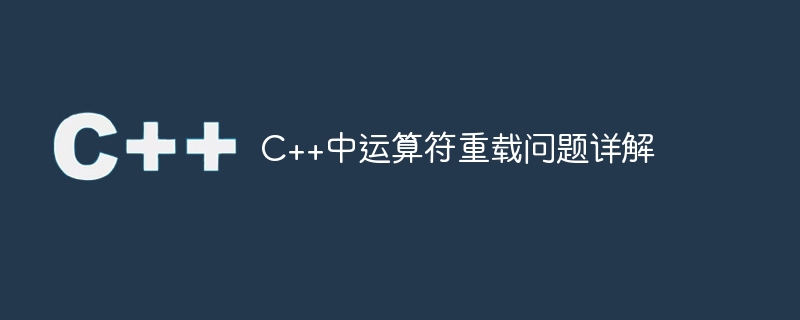

Detailed explanation of operator overloading in C
Operator overloading is an important feature in C. It allows us to overload operators for custom class types, making these Operations between class objects can be performed just like built-in types. In this article, we will discuss in detail the concept, usage, and common problems of operator overloading in C.
1. What is operator overloading
In C, an operator is a symbol used to perform specific operations. For example, the " " operator can be used to perform addition operations, and the "=" operator can be used to perform assignment operations. Operator overloading in C refers to redefining existing operators so that they can be used in custom class types.
Through operator overloading, we can implement operations between objects of custom classes. For example, we can define a Vector class and overload the " " operator so that two Vector objects can perform vector addition operations.
2. Syntax and usage of operator overloading
To overload an operator, we need to define a function. The name and parameter list of this function must follow specific rules. Taking the overloaded " " operator as an example, the definition of its function should be:
返回值类型 operator+ (参数列表) {
// 定义相应的运算逻辑
}Among them, the return value type can be any type, and the parameter list can be determined according to the specific situation.
In the function body, we can use custom logic to define the specific behavior of the operator. For example, for the " " operator, we can implement the logic of vector addition of two Vector objects.
The sample code is as follows:
class Vector {
private:
int x;
int y;
public:
Vector(int x, int y) {
this->x = x;
this->y = y;
}
Vector operator+ (const Vector& v) {
return Vector(x + v.x, y + v.y);
}
};
int main() {
Vector v1(1, 2);
Vector v2(3, 4);
Vector v3 = v1 + v2; // 调用运算符重载函数
return 0;
}In this example, we define a class named Vector, which contains two private member variables x and y. We overloaded the " " operator so that two Vector objects can be added directly. In the main function, we create two Vector objects v1 and v2 and add them to get v3.
3. Common operator overloading issues
1. Return value type
The return value type of an operator overloaded function can be any type, including basic types and custom types. or pointer type. The return value type needs to be determined based on specific requirements.
2. Parameter list
The parameter list of the operator overloaded function can be determined according to the requirements. Parameters can be constant references, non-const references, basic types or custom types.
3. Number and function of overloaded operators
Operator overloading in C is not limited to basic mathematical operators. We can overload most operators, including relational operators, logical operators, bitwise operators, etc. You need to decide which operator to overload based on specific needs.
4. Limitations of operator overloading
An important limitation of operator overloading is that it can only overload the operations defined by the class itself, and cannot change the priority and associativity of the operator. In addition, the behavior of some operators cannot be overloaded, such as the "." operator and the "::" operator.
4. Summary
Operator overloading is an important feature in C, which allows us to overload operators for custom class types. By using operator overloading correctly, we can simplify the code and improve the readability and maintainability of the program.
When using operator overloading, we need to pay attention to selecting the appropriate return value type and parameter list, and determine which operator to overload based on requirements. Additionally, operator overloading also has some restrictions that need to be understood and followed.
I hope this article will help you understand the problem of operator overloading in C.
The above is the detailed content of Detailed explanation of operator overloading problem in C++. For more information, please follow other related articles on the PHP Chinese website!




